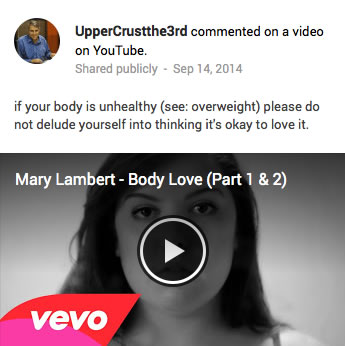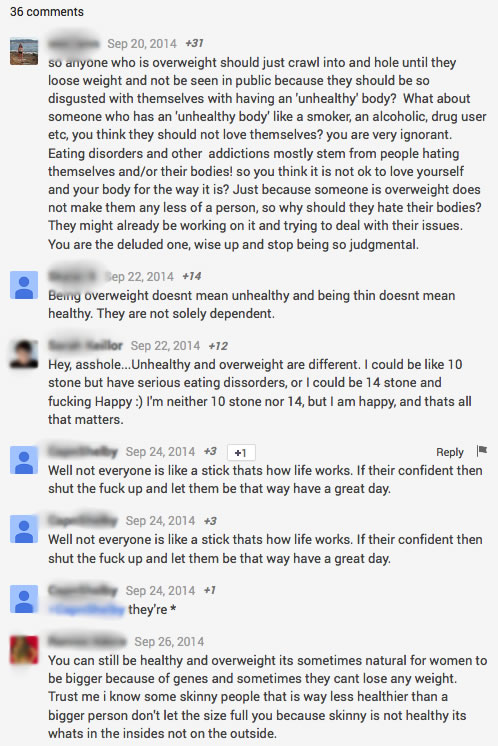I’m starting to get my act together around my dissertation, which is on how people express aggression online, and how the online environment facilitates reinforcement or change of social norms. While I have a very specific sample in mind, I recently stumbled on another idea through getting caught up in a YouTube flame-war.
A few days ago I watched this video on YouTube of Mary Lambert, a gay and body acceptance activist and pop artist/spoken word poet. It’s a really raw, powerful statement about the dual forces of self-love and internalized hate. I was moved, but then I read this comment:

I saw red, and in retaliation openly engaged in the kind of aggression that I usually avoid or observe at a distance:
 Mr. TheThird trolled me back (aggressively). Note his use of the words gluttony, shameful and violent imagery:
Mr. TheThird trolled me back (aggressively). Note his use of the words gluttony, shameful and violent imagery:
 I was not the first person to get riled up by Mr. TheThird’s comment, apparently this thread had been going on for a while:
I was not the first person to get riled up by Mr. TheThird’s comment, apparently this thread had been going on for a while:
 And then Mr. TheThird posted a long missive, not long after my comment:
And then Mr. TheThird posted a long missive, not long after my comment:
 Wow. I found his use of words like foul, vile, insidious, morally corrupt, medically aberrant more than a little off-putting and creepy. Disturbed and a bit scared, I took a step back to think about how we seem to keep our aggression in this endless loop on the internet.
Wow. I found his use of words like foul, vile, insidious, morally corrupt, medically aberrant more than a little off-putting and creepy. Disturbed and a bit scared, I took a step back to think about how we seem to keep our aggression in this endless loop on the internet.
Perhaps Mr. TheThird is projecting his unconscious fears of losing control on the woman who is singing about self-esteem-while-fat. When I react, I am in turn projecting my own anger at the forces that have led me to empathize with Ms. Lambert back onto him; rinse, repeat. We are locked in this dance of aggression where there is no understanding or compassion, just lots of anger, disdain, rationalization, and condescension. What might it take to change this pattern?
So, as an experiment, I came back, apologized for my ire, and instead explained my feelings and asked him some genuine questions.
 He never responded, which is not surprising given the research I’ve read on cyberbullying.
He never responded, which is not surprising given the research I’ve read on cyberbullying.
However, the experience made me think about my upcoming dissertation in a different way. Perhaps I was choosing to observe instead of participate in the online communities I am studying as a way to distance from my own discomfort. The inadvertent effect of engaging in this interaction was gaining insight into 1) what motivated me to react online, 2) The effects and repercussions of my engagement, and 3) various ways in which I can try to change the dynamic.
As a way to investigate these ideas further, I’m going to observe online conversations around body image and fat-acceptance, and also engage in them when moved to do so. I will document my experiment on this blog, analyzing the different expressions of aggression using George Vaillant’s interpretation of the Differential Identification of Defenses from The Diagnostic and Statistical Manual of Mental Disorders. Here’s a quick run-down from Vaillant’s book, The Wisdom of the Ego (1993 pp. 36-37)):
- Psychotic Defenses: Delusional projection, Denial, Distortion
- Immature Defenses: Projection, Fantasy, Hypochondriasis, Passive aggression, Acting out, Dissociation
- Neurotic (intermediate) Defenses: Displacement, Isolation/Intellectualization, Repression, Reaction formation
- Mature Defenses: Altruism, Sublimation, Suppression, Anticipation, Humor
So, trying this out, let me take a look at the interaction between Mr. TheThird, me, and some of the other participants.
Mary Lambert, the artist on which whose YouTube page this conversation resides, could be said to be utilizing sublimation, a mature defense, to deal with her negative feelings about her body, or trauma she has survived that was directed at her body (Ms. Lambert has been open about being the victim of childhood sexual abuse). Sublimation is the ability to direct the residual trauma towards a constructive activity such as songwriting and poetry. Further, her public role-modeling of self-love and survival might be considered altruism, the ability to identify with and alleviate the pain of others, which also may aid in her own healing.
Mr. TheThird’s comments seems to fit into aspects of projection, such as splitting (splitting negative from positive impulses) and demonstrating a superiority complex (obscuring feelings of inferiority), all of which are characterized as immature defenses. While I can only speculate about his psyche based on the language he uses, the voracity of his wording suggests that he is projecting an aspect of his personality that he as “split” off from his core personality, such as desire, craving, or low self-control. His later, lengthy post displays some of the same traits, but also utilizes intellectualization as a way to justify his verbal attacks. Reaction formation could also be demonstrated by his desire to appear rational and scientific in a discussion where he also uses terminology that clearly demonstrates strong negative emotions.
My initial posting could qualify as displacement (neurotic) or perhaps acting out (immature) as I was well aware of my angry feelings, but chose to inflict them impulsively and without forethought. My personal history with my body image is painful, and while I’ve become very accepting of myself and others, my ego is still vulnerable when it comes to aggressive criticism. I personalized Mr. TheThird’s comment and responded as if it was directed specifically at me (and perhaps also as a projection of my own vulnerability onto other participants, who I felt the impulse to defend). When he responded with more violent language, I became frightened and considered withdrawal, a neurotic defense I’ve used frequently to avoid painful memories, impulses, and feelings. I think this default defense is also the reason behind my initial choice to observe online aggression rather than engage with the participants more directly.
When I took ownership of my feelings and asked genuine questions about Mr. TheThird’s motivation, I was perhaps engaging in courage and self-regulation (mature defenses); I opened myself up to dialogue with an aggressive person, and made some rules for myself around how much time I would spend online in order to project my psyche.
While Mr. TheThird has not yet chosen to respond, so perhaps he has chosen withdrawal, a neurotic defense more mature than his initial behavior.
It has also been interesting to look at the comments of others, which range from mollifying both groups, to enraged all caps cursing, to a lot of arguing of various facts. Intellectualization seems to be the default stance in these arguments, which frequently devolves into passive aggression, acting out, and distortion. I consciously choose not to debate the facts around obesity and health as I think it really amounts to arguing about the validity of a stereotype, which is by its nature persecutory. There is a ton of medical information that both validates and refutes the dangers and perimeters of obesity, but this has nothing to do with our individual lives, choices, and feelings. It seems like trying to justify or rationalize our positive and negative feelings about ourselves and others using cherry-picked science only gets us so far. What I’m really interested in is the larger patterns that emerge in these mini-explosions of aggression. What is their anatomy? Is there a common pattern? Are there different kinds? Do they evolve, or just die down and re-emerge elsewhere? I’ll be looking at these questions as I observe and participate in other discussions around body acceptance. Stay tuned!
